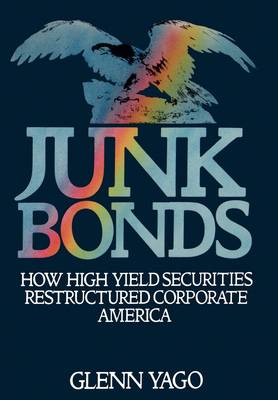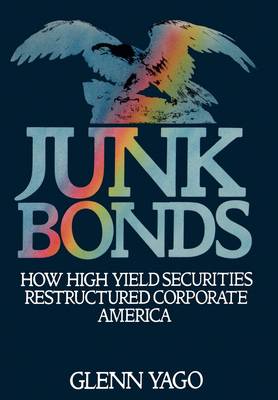
- Retrait gratuit dans votre magasin Club
- 7.000.000 titres dans notre catalogue
- Payer en toute sécurité
- Toujours un magasin près de chez vous
- Retrait gratuit dans votre magasin Club
- 7.000.000 titres dans notre catalogue
- Payer en toute sécurité
- Toujours un magasin près de chez vous
Junk Bonds
How High Yield Securities Restructured Corporate America
Glenn Yago
Livre relié | Anglais
111,45 €
+ 222 points
Description
Junk bonds burst into the nation's headlines as the fastest growing and most controversial financial instruments of the 1980s. Branded with an unflattering nickname, these high yield securities were tarnished in the public eye by waves of negative publicity. Critics cast the financiers and entrepreneurs who pioneered their use as symbols of a decade of greed and financial excess. By the end of the 1980s, the heyday of junk bonds had seemingly come to a close with the conviction of junk bond pioneer Michael Milken and the bankruptcy of Drexel Burnham Lambert, the brokerage that dominated the high yield market. But the controversy surrounding junk bonds continues.
Now, in Junk Bonds, business professor Glenn Yago turns the tables on conventional wisdom about this new financial technology. He offers the first systematic examination of the facts about high yield securities. His analysis provides hard evidence that demystifies junk bonds and explodes many of the popular myths that surround them.
Junk Bonds sheds light on the role of high yield financing in what Yago calls the democratization of capital. Before the advent of junk bonds, only companies with an "investment grade" rating--five percent of the 23,000 American companies with sales over $35 million--had access to long term capital. In effect, the author argues, 95 percent of American companies were denied the means to finance growth and business development. Yago shows how junk bonds changed all that, breathing life into thousands of American companies that had been shunned by the capital markets. His research demonstrates that these "junk" companies outperformed many Fortune 500 firms in job creation, product development, sales, and business innovation.
The real contribution of junk bonds, according to Yago, was to improve the productivity and competitiveness of American business by restructuring companies in the wake of the corporate conglomerations of the 1960s and 1970s. His findings show that divestitures by companies financed with high yield bonds were not necessarily destructive. Many sold-off units flourished as independent enterprises at a time when numerous "investment grade" companies stagnated or closed plants or fired workers. This restructuring of corporate America has enabled businesses to compete in a changing international environment, benefiting managers, workers, stockholders, and investors alike.
Junk Bonds provides readers with a scholarly analysis that shears away the hype and hysteria that often accompany rapid change. And at a time when Wall Street is under greater scrutiny than at any time since the Depression, this provocative study provides a timely and thoughtful contribution to the debate surrounding junk bonds.
Now, in Junk Bonds, business professor Glenn Yago turns the tables on conventional wisdom about this new financial technology. He offers the first systematic examination of the facts about high yield securities. His analysis provides hard evidence that demystifies junk bonds and explodes many of the popular myths that surround them.
Junk Bonds sheds light on the role of high yield financing in what Yago calls the democratization of capital. Before the advent of junk bonds, only companies with an "investment grade" rating--five percent of the 23,000 American companies with sales over $35 million--had access to long term capital. In effect, the author argues, 95 percent of American companies were denied the means to finance growth and business development. Yago shows how junk bonds changed all that, breathing life into thousands of American companies that had been shunned by the capital markets. His research demonstrates that these "junk" companies outperformed many Fortune 500 firms in job creation, product development, sales, and business innovation.
The real contribution of junk bonds, according to Yago, was to improve the productivity and competitiveness of American business by restructuring companies in the wake of the corporate conglomerations of the 1960s and 1970s. His findings show that divestitures by companies financed with high yield bonds were not necessarily destructive. Many sold-off units flourished as independent enterprises at a time when numerous "investment grade" companies stagnated or closed plants or fired workers. This restructuring of corporate America has enabled businesses to compete in a changing international environment, benefiting managers, workers, stockholders, and investors alike.
Junk Bonds provides readers with a scholarly analysis that shears away the hype and hysteria that often accompany rapid change. And at a time when Wall Street is under greater scrutiny than at any time since the Depression, this provocative study provides a timely and thoughtful contribution to the debate surrounding junk bonds.
Spécifications
Parties prenantes
- Auteur(s) :
- Editeur:
Contenu
- Nombre de pages :
- 272
- Langue:
- Anglais
Caractéristiques
- EAN:
- 9780195061116
- Date de parution :
- 15-11-90
- Format:
- Livre relié
- Format numérique:
- Genaaid
- Dimensions :
- 163 mm x 246 mm
- Poids :
- 653 g







